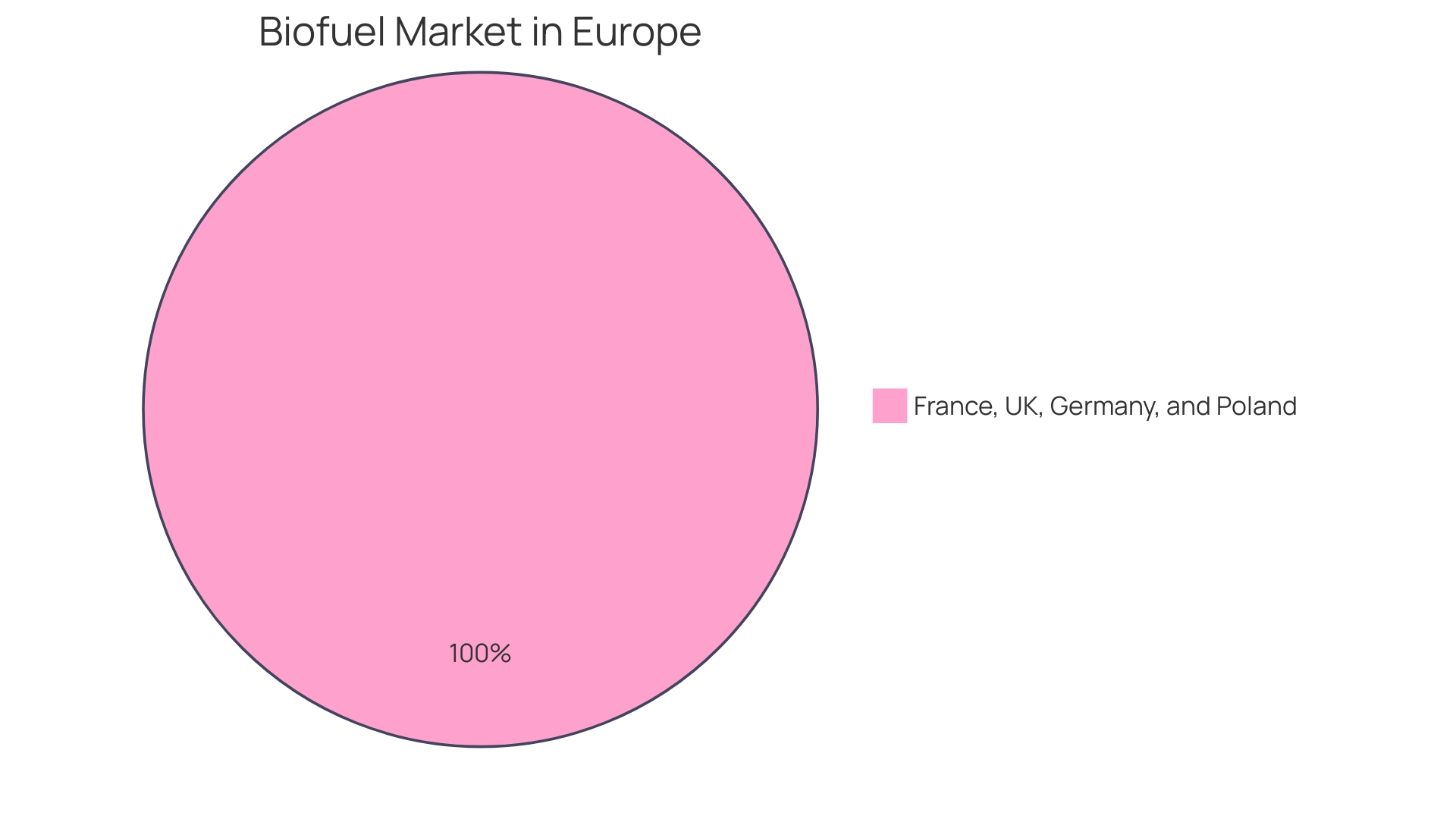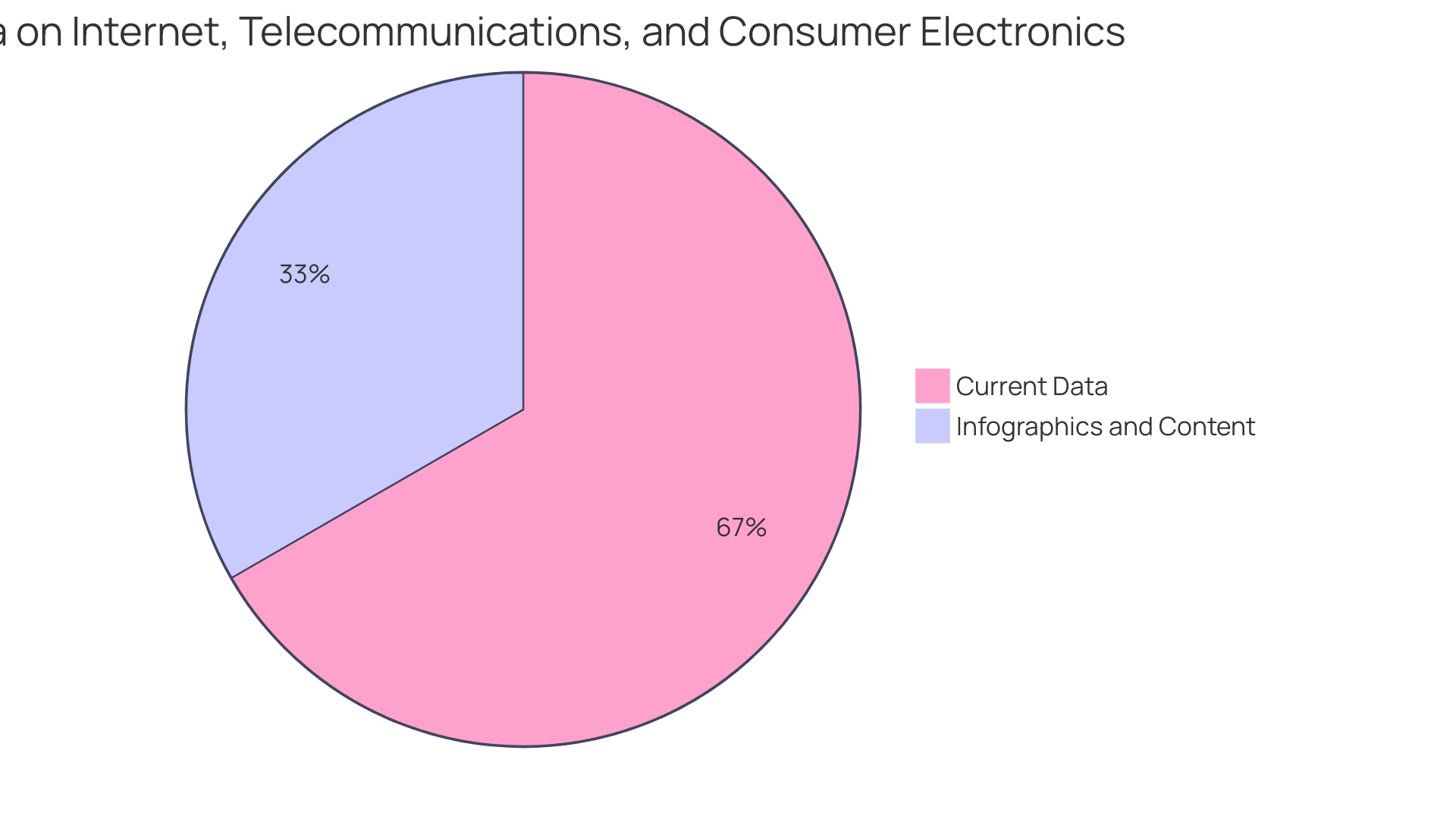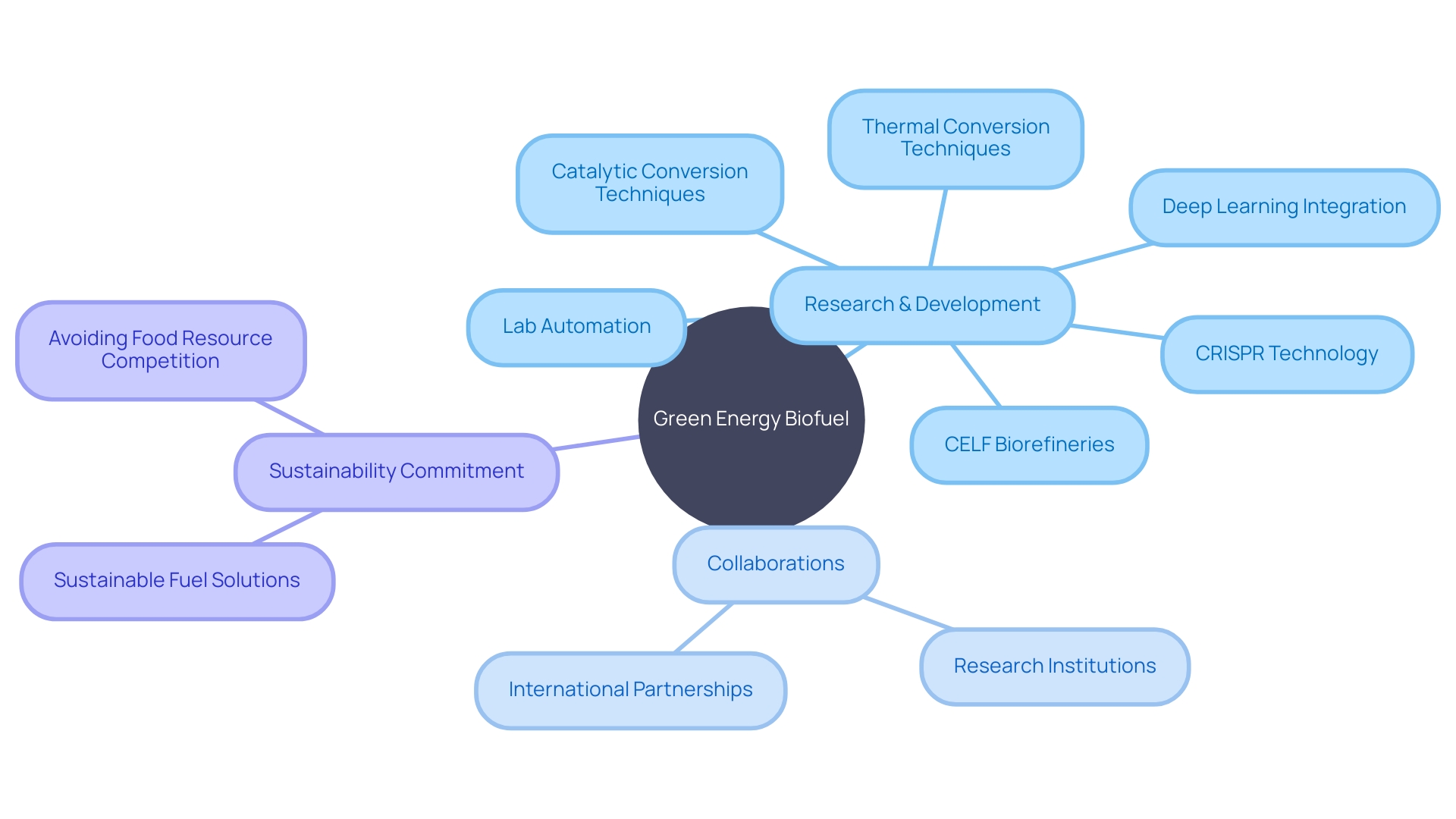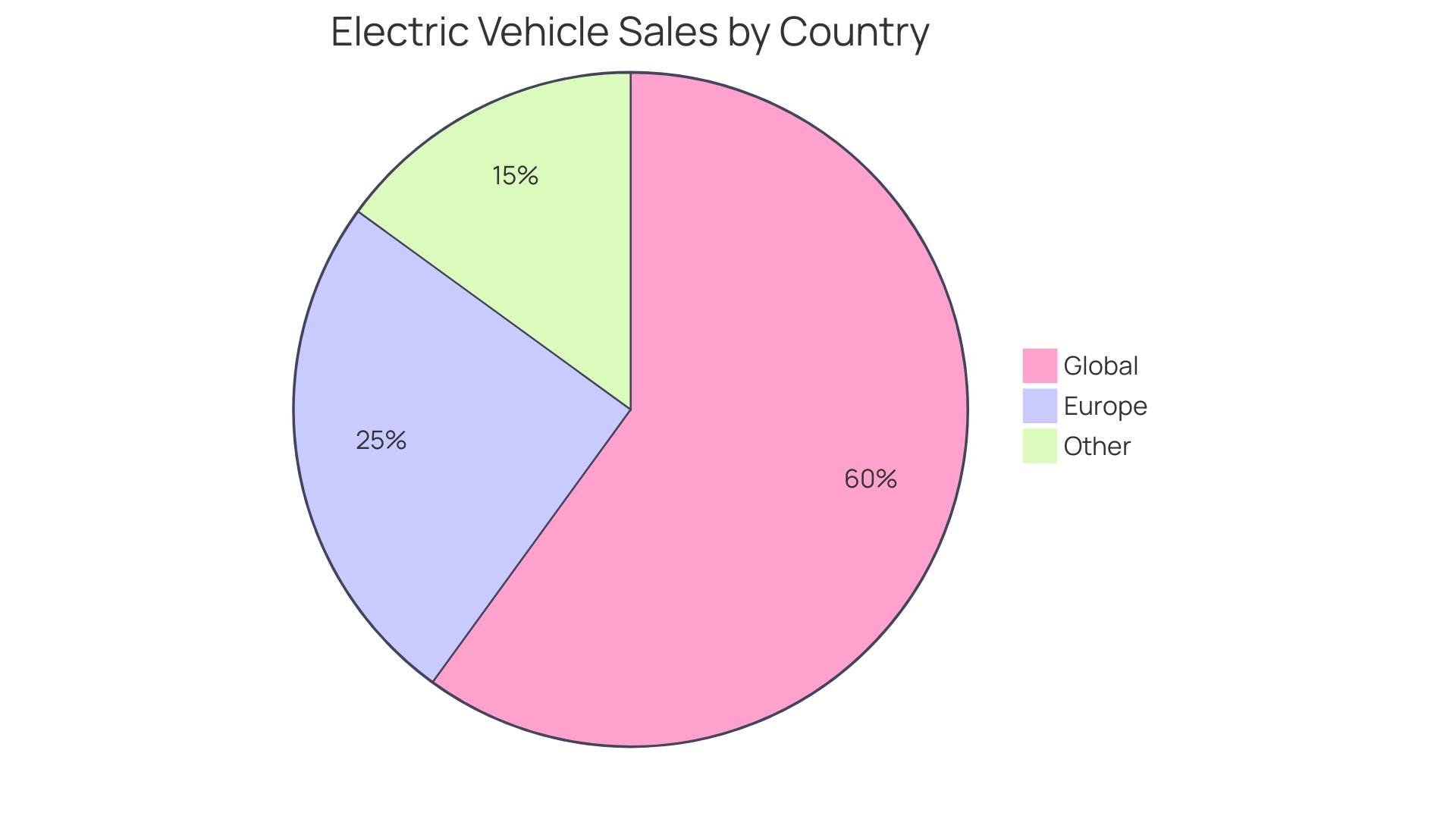Introduction
The renewable fuels industry is undergoing a transformative shift towards sustainable energy solutions, and companies like Green Energy Biofuel are at the forefront of this movement. By harnessing plant-based feedstocks and waste materials, Green Energy Biofuel is forging a greener future that curtails greenhouse gas emissions and contributes to the circular economy. In Europe, countries like France, the UK, Germany, and Poland are leading the surge in biofuel utilization, with the European Union implementing policies to bolster biofuel use.
This strategic focus is expected to propel Europe as the fastest-growing region in the biofuel market. The sector's potential and challenges are echoed by industry leaders, emphasizing the technical readiness required for market success. With BP Inc.'s commitment to a net-zero goal by 2050 and the integration of biofuels into existing energy infrastructures, the industry is poised to play a pivotal role in shaping a sustainable and energy-secure future.
The article explores the different generations of biofuels, the environmental benefits they offer, and their role in reducing greenhouse gas emissions. It also delves into the significance of biofuels in ensuring energy security and independence, promoting rural development and economic opportunities, and contributing to the circular economy. Technological innovation and continuous improvement in biofuel production, as well as the sustainability considerations and case studies of Green Energy Biofuel, are also discussed.
The article concludes by highlighting the future trends and policy initiatives that will shape the biofuel landscape, emphasizing the pivotal role Green Energy Biofuel will play in sculpting a more sustainable future.
What is Green Energy Biofuel?
The intricacies of biofuel development, conversion, and trading are key to sustainable energy advancement. Companies in the sector, like Green Energy Biofuel, are harnessing the potential of renewable energy sources, focusing on plant-based feedstocks and waste materials to forge a greener future. This approach not only curtails greenhouse gas emissions but also fortifies the circular economy by revalorizing waste into energy.
In the European market, significant strides have been made, with countries like France, the UK, Germany, and Poland leading the surge in biofuel utilization. The region's market is buoyed by ethanol, biodiesel, and renewable diesel, with the European Union instigating various policies to bolster biofuel use. Such strategic initiatives are anticipated to propel Europe as the fastest-growing region in the biofuel market.
Key industry figures echo the sentiment of the sector's potential and hurdles. A quote attributed to a thought leader in bioinnovation encapsulates the journey from conception to market success, emphasizing the engineering scale of technical readiness that spans from the ideation stage to commercially viable products.
The sector's landscape is also characterized by environmental consciousness as evidenced by recent news. For instance, BP Inc.'s commitment to a net-zero goal by 2050 underscores the industry's pivot towards sustainable practices. Moreover, the integration of biofuels into existing energy infrastructures supports diverse renewable energy sources, thereby ensuring a stable energy supply.
Professionals like Brian, with a forestry industry background and procurement expertise, and Alyssa, with a decade in energy conservation projects, exemplify the human capital propelling this sector. Their collective experience underscores the importance of strategic supply chain management and stakeholder engagement in scaling biofuel operations.
Statistics from the 'Kyoto basket' of greenhouse gases provide a quantifiable measure of the sector's environmental impact, highlighting the need for meticulous emission monitoring and reporting. This data, encapsulated in CO2-equivalents, underscores the commitment of companies in the field to transparency and regulatory compliance.
With the convergence of policy, innovation, and expertise, the biofuel industry is poised to play a pivotal role in shaping a sustainable and energy-secure future.

Types of Biofuels: First, Second, and Third Generation
Biofuels are renewable energy sources derived from organic materials which are categorized into distinct generations based on their feedstocks and production methodologies. The first-generation biofuels, commonly produced from food crops like corn and sugarcane, have raised concerns over food security and land use prioritization. On the other hand, the second-generation biofuels utilize non-edible biomass including agricultural waste and certain grasses, offering a more sustainable alternative without competing with food resources. Poplar trees, for instance, have emerged as an ideal feedstock for innovative biorefinery processes that fractionate biomass for varied product outputs.
Moreover, third-generation biofuels represent a cutting-edge approach that employs genetically engineered organisms for the conversion of non-food biomass into energy. Algae, known for its rapid growth and high oil content, is notably promising in this realm. Green Energy Biofuel's commitment to second and third-generation fuels aligns with the industry's pivot towards more eco-friendly and efficient bioenergy solutions. This shift is also reflected in the growing production of bio-based diesel, predominantly derived from vegetable oils, which now fuels a significant portion of the renewable diesel market.
As the sector evolves, bioenergy's potential to supplant petroleum-based products in plastics, paints, and even as a clean-burning diesel alternative is becoming increasingly evident. However, the real challenge lies in improving the cost-effectiveness and efficiency of biofuel production. Supported by institutions and governmental initiatives, the advancement of bioenergy technologies aims to reduce greenhouse gas emissions, enhance energy security, and promote sustainable energy alternatives, as evidenced by the slight rise in indigenous biogas production within the European Union.
Environmental Benefits of Green Energy Biofuel
Biofuels represent a significant stride toward greener energy, providing a renewable alternative to conventional fossil fuels. By harnessing the power of biotechnology, we are able to convert organic matter like plants, algae, and agricultural waste into biofuels, categorized into first, second, third, and fourth generations, each utilizing different raw materials and production technologies. Biotechnology has been instrumental in tackling the challenges of biofuel production, enhancing their sustainability and economic viability.
The environmental advantages of biofuels are compelling. They offer substantial reductions in greenhouse gas emissions due to their inherently lower carbon footprint. When biofuels are produced and burned, the amount of carbon dioxide released is markedly less than that of traditional fossil fuels, contributing positively to climate change mitigation efforts. Furthermore, biofuels emit lower levels of pollutants, including sulfur dioxide and particulate matter, which leads to improvements in air quality.
From a socio-economic perspective, the transition to biofuels aligns with energy equity, supporting the human right to a safe and healthy environment. As renewable energy becomes more affordable and reliable, it eliminates the tough choices between essential needs such as paying for energy versus buying food or medicine. Moreover, advancements in energy efficiency, like building retrofits and improved insulation, complement the use of biofuels by promoting better air quality and overall well-being.
The production of bio-based diesel, primarily from vegetable oil sources such as soybean and canola, exemplifies the scalability of biofuels. These oils, along with inedible corn oil derived from ethanol production, make up over 80 percent of bio-based diesel. Additionally, technologies and facilities already exist that can be adapted to produce biofuels, making them a sustainable option for traditionally carbon-intensive sectors like heavy transport and industry. While their application in industries such as aviation and shipping is still growing, biofuels are increasingly common in road transport, particularly in countries like Spain where they have been blended with conventional fuels for years.
In summary, biofuels not only provide an eco-friendly energy solution but also support social and economic development through enhanced energy access and sustainability. They are a testament to the symbiotic relationship between technological innovation and environmental stewardship, propelling us towards a more resilient and equitable energy future.
Role of Green Energy Biofuel in Reducing Greenhouse Gas Emissions
In the dynamic landscape of renewable energy, the strategic production of biofuels from renewable feedstocks stands out as a catalyst for reducing greenhouse gas emissions. Europe, in particular, is witnessing a surge in biofuel utilization, with countries like France, the UK, Germany, and Poland leading the charge. The European biofuel market thrives on ethanol, biodiesel, and renewable diesel, supported by progressive policies and initiatives. These biofuels, when used as a substitute for fossil fuels in transportation, aviation, and industrial applications, present a lower carbon intensity, which is crucial in the global fight against climate change.
For instance, Eurostat's methodology, which includes international transport emissions, reveals a comprehensive picture of the greenhouse gas emissions across various sectors. This information underscores the importance of sector-wide innovation in reducing emissions. Notably, advanced biofuel feedstocks are becoming increasingly critical, as highlighted by Oil and Gas Analyst Ravindra Puranik from GlobalData. These feedstocks alleviate food security concerns while offering a sustainable energy source.
Furthermore, the ambitious project by Fertiberia and Heineken Spain illustrates the transformative potential of renewable energy in reducing carbon footprints. By replacing natural gas with green hydrogen in the production of low-carbon fertilizers, the project aligns with Heineken's commitment to brewing with 100% renewable energy by 2025 and achieving net-zero across its value chain by 2040.
These initiatives are a testament to the fact that innovation in renewable energy resources, including biofuels, is not just a possibility but a necessity. As the European region moves forward with the fastest-growing biofuel market, the integration of cutting-edge technologies like agriculture 4.0 further enhances the efficiency of these green solutions. The commitment to sustainability is echoed by the Climate Ethanol Alliance, advocating for evidence-based policymaking and promoting renewable ethanol as a viable alternative to oil.
The convergence of policy, innovation, and market dynamics in Europe's biofuel sector demonstrates a robust approach to diminishing the environmental impact and advancing towards a sustainable future. With each step forward, the region sets a precedent for global efforts in combating climate change through renewable energy sources.
Energy Security and Independence through Green Energy Biofuel
Uruguay's transformative journey towards energy sovereignty exemplifies the profound impact of biofuels and renewable resources on national energy security. The nation's strategic shift from a hydro-thermal mix to a renewable energy powerhouse, now generating up to 98% of its electricity from clean sources, underscores the potential for biofuels to drive economic growth and job creation. By capitalizing on abundant wind, solar, and biomass resources, Uruguay has reduced its dependence on imported oil, mitigating the risks associated with volatile fossil fuel markets.
The global energy landscape is seeing a similar paradigm shift, with an increasing focus on renewable energy sources. In 2023, the United Nations Sustainable Development Goals and the Paris Agreement have emphasized the need for affordable, reliable renewable energy as a cornerstone for sustainability and climate change mitigation. Despite 80% of global energy still being derived from fossil fuels, the push for decarbonization is gaining momentum, with countries like Uruguay setting a precedent for others to follow.
Investments in renewables are on the rise, as highlighted by statistics indicating significant financial commitments from 2012-2021. The renewable power capacity continues to grow, with the European Union reporting a 1.7% increase in indigenous biogas production in 2021, marking a step towards reducing reliance on imported fossil fuels.
Renewable energy not only supports energy independence but also contributes to social equity and public health. The U.S. Department of Energy has acknowledged the benefits of clean energy in promoting energy equity and protecting vulnerable communities from air pollution. Furthermore, as sustainable biofuels like renewable ethanol gain recognition for their role in reducing greenhouse gas emissions, countries are urged to adopt a more open-minded approach, as highlighted by recent G7 declarations.
In light of these developments, biofuels emerge as a critical component of the renewable energy mix, contributing to energy security, economic resilience, and environmental sustainability. The success stories and ongoing initiatives around the world serve as a compelling narrative for the strategic role of biofuels in the global pursuit of a decarbonized future.

Rural Development and Economic Opportunities
Bioenergy, derived from biomass such as agricultural residues and waste, presents a transformative opportunity for rural economies. With technological advancements like Power to X, rural communities have the potential to convert these resources into valuable energy sources, stimulating economic development and job creation in these areas.
In the agricultural sector, the importance of utilizing waste cannot be overstated. An astonishing 1.2 billion tonnes of agricultural produce are wasted yearly according to a World Wildlife Fund (WWF) report from 2021, equivalent to 15% of total production. This not only signifies a substantial loss of resources but also exacerbates environmental harm. By embracing bioenergy production, these communities can mitigate waste, reduce pollution, and harness a previously untapped revenue stream.
The implementation of small-scale biorefinery prototypes and the subsequent assessment of their mechanical and emissions performance in various engines, as explained by Claudia Gomez, a researcher with the PQI group, could pave the way for more widespread adoption. Moreover, the strategic development of these technologies, alongside efforts to negotiate with technology developers, investors, and companies, can lead to a more robust bioenergy sector.
However, realizing this potential requires supportive policies and regulatory frameworks, as highlighted by Karen Peralta, director of the Andi-Naturgas Hydrogen Chamber. Investment in these renewable technologies must be encouraged for them to become competitive, necessitating a conducive environment for long-term investment. The economic revitalization of rural manufacturing through clean energy tax incentives has been significant, with over 67,000 new jobs in rural counties and substantial tax revenue generation, as per E2 and BW Research Partnership data.
In conclusion, the development of bioenergy not only offers a solution to agricultural waste but also serves as a catalyst for rural development, diversifying income sources for farmers and invigorating local economies with new jobs and markets.
Waste Utilization and Circular Economy in Biofuel Production
Amidst growing environmental concerns, Green Energy Biofuel stands out as an innovative force in the circular economy by transforming waste materials, including used cooking oil, animal fats, and agricultural residues, into valuable biofuels. This transformative process not only reduces waste volume but also lessens the negative impact of waste disposal on the environment, adhering to the principles of a circular economy that emphasizes resource efficiency.
Philip Siu, Co-Founder and CEO of EcoCeres, recognizes the potential in agricultural waste as an untapped resource within the supply chain. Echoing this sentiment, a World Wildlife Fund (WWF) report highlights an alarming 1.2 billion tons of agricultural produce wasted annually, accounting for 15% of total production. The implications are clear: valuable resources are squandered, and environmental degradation is exacerbated by the inputs used in production.
This issue is further compounded by the traditional disposal methods of burning or neglecting waste, both of which contribute to air pollution and greenhouse gas emissions. Despite the environmental and economic advantages of recycling agricultural waste, financial hurdles pose a significant challenge, particularly for small-scale farmers.
To address such challenges, initiatives like the Neste Excellence Program have emerged, promoting organizational changes and development portfolio optimization. Core to this initiative is the adoption of digital and data-driven decision-making, alongside end-to-end process excellence, aiming to foster innovation and cooperation within the industry.
A shift towards more sustainable practices is further supported by the growth of the biofuel market in Europe, which is expected to be the fastest-growing region. With key economies like France, the UK, Germany, and Poland driving demand for ethanol, biodiesel, and renewable diesel, the EU's proactive policies and initiatives serve as a catalyst for this expansion.
In light of these developments, Green Energy Biofuel's commitment to converting waste into renewable energy not only contributes to environmental sustainability but also aligns with the broader industry trends towards efficient resource utilization and sustainable production.
Technological Innovation and Continuous Improvement in Biofuels
At the cutting edge of renewable energy, Green Energy Biofuel is spearheading a transformative approach to biofuel production through a multifaceted research and development strategy. By delving into the complexities of both thermal and catalytic conversion techniques, the company is unlocking innovative pathways to turn a variety of crude types into valuable chemicals. These pioneering efforts are led by a dedicated team of over 80 engineers and scientists, including the astute principal scientist and chief technologist, Ibrahim A. Abba, whose vision encompasses a future where sustainable products and services ensure a high quality of life for all generations, without environmental compromise.
Collaboration is at the heart of Green Energy Biofuel's success, leveraging a global network of talent and establishing key international partnerships to accelerate development and optimize processes. The company is not only advancing its own technological capabilities but is also contributing significantly to the broader biofuels industry. By embracing multiple research tracks, each with unique advantages and developmental stages, Green Energy Biofuel is ensuring a diverse portfolio of technology options capable of adapting to shifting market dynamics.
A prime example of this forward-thinking approach is the company's investment in Co-Solvent Enhanced Lignocellulosic Fractionation (CELF) biorefineries, which address the limitations of first-generation biofuels. These biorefineries employ a novel fractionation method that allows for the parallel production of various bio-based products. This innovation is a collaboration between leading research institutions, including the National Renewable Energy Laboratory, and is supported by the U.S. Department of Energy, marking a significant leap toward second-generation biofuel production that utilizes non-edible plant biomass, such as poplar trees, thus avoiding competition with food resources.
In the realm of digital biology, Green Energy Biofuel is harnessing the convergence of deep learning, lab automation, and CRISPR technology to transition from traditional trial-and-error methods to precise engineering of biological systems. This approach echoes the sentiments of NVIDIA CEO Jensen Huang, who envisions digital biology as an engineering marvel that will redefine the industry. The cumulative impact of these technological integrations is a robust, sustainable, and cost-effective production system that not only achieves higher yields but also solidifies Green Energy Biofuel's role as a leader in the development of sustainable fuel solutions.

Sustainability Considerations for Green Energy Biofuel Production
Green Energy Biofuel is at the forefront of integrating sustainability into biofuel production, rigorously following criteria that ensure the ethical procurement of feedstocks and environmentally conscious manufacturing processes. Their strategy encompasses a comprehensive assessment of the ecological footprint, notably the impact on biodiversity, water conservation, and soil preservation. The company's commitment extends to the social aspect by upholding fair labor practices and contributing positively to local communities. The overarching goal is to deliver biofuels that not only mitigate environmental harm but also bolster social and economic sustainability.
The company's approach aligns with the advanced methodologies in biofuel production, like those developed by collaborative research teams from UCR, the Center for Bioenergy Innovation managed by Oak Ridge National Laboratories, and the National Renewable Energy Laboratory. These methods, supported by the U.S. Department of Energy, emphasize the use of non-food biomass, such as poplar trees, to reduce competition with food production and diminish the environmental impact.
The biofuel sector is witnessing significant advancements, with innovations that promise substantial benefits for climate action, energy independence, and air quality. Ethanol, a leading biofuel, has proven its worth as a renewable alternative to oil over two decades, and policies are evolving to further leverage its potential for sustainable transport. Europe, in particular, is poised to experience rapid growth in the biofuel market, driven by policy initiatives and an increase in the adoption of ethanol, biodiesel, and renewable diesel.
In the aviation industry, sustainable aviation fuels (SAF) are emerging as the most feasible option for reducing carbon emissions, with airlines like American, Delta, and United aiming for carbon neutrality by 2050. Although the current production of SAF is a fraction of the demand, there is a concerted effort to scale up supply to meet the industry's fuel requirements.
The importance of biofuels extends to the Midwest, where biofuel crops account for a significant portion of the region's agricultural emissions. Policymakers and the public are encouraged to consider the implications of biofuel production on greenhouse gas emissions, as biofuels remain a critical component in the transition to a low-carbon energy future. By adhering to responsible production practices, companies like Green Energy Biofuel contribute to a more sustainable and ethical biofuel landscape.

Case Study: Green Energy Biofuel's Services and Impact
Highlighting the strides made in renewable energy, a noteworthy case study emerges from BIOTERRAN, a company distinguished by its innovative biofuel technology. Developed through the pioneering research of Professor Andrzej Vogt, Ph.D., at the University of Wroclaw, this technology represents a significant advancement in the field. The case study could illuminate the challenges and triumphs of BIOTERRAN's project implementations, showcasing their biofuels as a versatile component in the energy mix, complementing other renewable sources such as solar and wind power.
The biofuel market across Europe, bolstered by economies like France, the UK, Germany, and Poland, is experiencing rapid growth due to a collective push towards sustainable energy, supported by EU policies. This region is poised to lead the market's expansion, driven by the adoption of ethanol, biodiesel, and renewable diesel. BIOTERRAN's biofuels, known for their high quality and long shelf-life, exemplify the region's commitment to cleaner, greener energy solutions.
The integration of BIOTERRAN's biofuels into existing infrastructures highlights the potential for renewable energy to maintain a reliable supply, even as we pivot away from traditional fossil fuels. With the global spotlight on net-zero objectives, as demonstrated by BP Inc.'s 2050 ambitions, the relevance of such case studies is underscored. They not only provide insight into the practical implementation of sustainable practices but also reflect the industry's adaptability and resilience in the face of evolving energy landscapes and stringent emissions regulations.

Future of Green Energy Biofuel: Trends and Policy Initiatives
Green Energy Biofuel is witnessing a significant surge in its development and adoption, fostered by both technological advancements and supportive policy measures. The biofuel landscape is rapidly evolving, with cutting-edge technologies enhancing the efficiency of biofuel production. Innovations such as Co-solvent Enhanced Lignocellulosic Fractionation (CELF) are revolutionizing the industry by enabling the fractionation of biomass into its constituent components, allowing for a diverse range of products to emerge from a single source. This marks a departure from earlier methods which depended heavily on food crops like corn and sugarcane for sugar syrups conversion.
Moreover, the demand for sustainable aviation fuel is intensifying as the aviation sector seeks to mitigate its 2% contribution to global energy-related carbon dioxide emissions. With the technical and economic challenges associated with battery- and hydrogen-powered aircraft, sustainable aviation fuel, as defined by the International Civil Aviation Organization, emerges as the most practical solution. This is underscored by commitments from major airlines aiming for a 10% sustainable aviation fuel utilization by 2030.
In the realm of policy, Europe stands out as a prime example, being projected as the fastest-growing region in the biofuel market. France, the UK, Germany, and Poland are leading forces in this expansion, embracing ethanol, biodiesel, and renewable diesel, spurred on by the European Union's comprehensive policies and incentives that encourage biofuel use.
Furthermore, the green energy sector is not without its challenges. For instance, the shipping industry, a significant consumer of hydrocarbon fuels, faces difficulties in transitioning to cleaner energy sources due to its aging fleet and stringent emission regulations. Additionally, the energy workforce reflects a notable gender disparity, indicating a need for broader inclusivity within the sector.
In light of these developments, hydrogen fuel cells are garnering attention as a viable, continuous source of clean energy, given the abundant availability of hydrogen in the universe. The interest in hydrogen as a sustainable energy solution is on the rise, with more companies exploring its potential.
The push for Green Energy Biofuel is also evident in the actions of industry giants such as BP Inc., which has set an ambitious target to achieve net-zero emissions by 2050, in part by reducing oil and gas production. The transition to renewable energy sources, including biofuels, is an integral aspect of such corporate strategies.
As the global focus intensifies on reducing reliance on fossil fuels, regions like the Middle East, North, and West Africa, known for their substantial oil and gas reserves, are also under scrutiny, bringing to light the pressing need for diversified energy portfolios that include biofuels.
By delving into these advancements, regulatory frameworks, and global commitments, the article underscores the pivotal role of Green Energy Biofuel in sculpting a more sustainable and environmentally conscious future.
Conclusion
Green Energy Biofuel is spearheading the transformation of the renewable fuels industry towards sustainable energy solutions. By utilizing plant-based feedstocks and waste materials, they are curbing greenhouse gas emissions and promoting the circular economy. Europe, led by countries such as France, the UK, Germany, and Poland, is driving the adoption of biofuels through supportive policies, positioning the region as the fastest-growing market.
The article explores the environmental benefits of biofuels, emphasizing their role in reducing greenhouse gas emissions. It also highlights the importance of biofuels in ensuring energy security, promoting rural development, and contributing to the circular economy. Technological innovation, sustainability considerations, and case studies of Green Energy Biofuel are discussed.
Future trends and policy initiatives are outlined, including the integration of cutting-edge technologies like Co-solvent Enhanced Lignocellulosic Fractionation (CELF) and the increasing demand for sustainable aviation fuel. Europe's proactive policies and incentives are driving the growth of the biofuel market in the region.
Green Energy Biofuel's commitment to sustainability is evident in their ethical procurement practices and environmentally conscious manufacturing processes. They align with advanced methodologies in biofuel production, focusing on non-food biomass to minimize environmental impact.
In conclusion, Green Energy Biofuel is playing a pivotal role in shaping a sustainable future. Through their innovative research and development strategies, global collaborations, and dedication to sustainability, they are leading the way in the biofuel industry. As the industry evolves, their commitment to technological advancements and reducing reliance on fossil fuels positions them as a key player in creating a more sustainable future.




